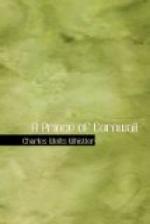Ina’s new policy with the conquered Welsh is historic and well known. Even in the will of King Alfred, two hundred years later, some of the best towns in west Somerset and Dorset are spoken of as “Among the Welsh kin,” and there is yet full evidence, in both dialect and physique, of strongly marked British descent among the population west of the Parrett.
There is growing evidence that very early settlements of Northmen, either Norse or Danish, or both, contemporary with the well-known occupation of towns, and even districts, on the opposite shores of South Wales, existed on the northern coast of Somerset and Devon. Both races are named by the Welsh and Irish chroniclers in their accounts of the expulsion of these settlers from Wales in A.D. 795, and the name of the old west country port of Watchet being claimed as of Norse origin, I have not hesitated to place the Norsemen there.
Owen and Oswald, Howel and Thorgils, and those others of their friends and foes beyond the few whose names have already been mentioned as given in the chronicles, are of course only historic in so far as they may find their counterparts in the men of the older records of our forefathers. If I have too early or late introduced Govan the hermit, whose rock-hewn cell yet remains near the old Danish landing place on the wild Pembrokeshire coast between Tenby and the mouth of Milford Haven, perhaps I may be forgiven. I have not been able to verify his date, but a saint is of all time, and if Govan himself had passed thence, one would surely have taken his place to welcome a wanderer in the way and in the name of the man who made the refuge.
Chas. W. Whistler.
Stockland, 1904.
CHAPTER I. HOW OWEN OF CORNWALL WANDERED TO SUSSEX, AND WHY HE BIDED THERE.
The title which stands at the head of this story is not my own. It belongs to one whose name must come very often into that which I have to tell, for it is through him that I am what I may be, and it is because of him that there is anything worth telling of my doings at all. Hereafter it will be seen, as I think, that I could do no less than set his name in the first place in some way, if indeed the story must be mostly concerning myself. Maybe it will seem strange that I, a South Saxon of the line of Ella, had aught at all to do with a West Welshman—a Cornishman, that is—of the race and line of Arthur, in the days when the yet unforgotten hatred between our peoples was at its highest; and so it was in truth, at first. Not so much so was it after the beginning, however. It would be stranger yet if I were not at the very outset to own all that is due from me to him. Lonely was I when he first came to me, and lonely together, in a way, have he and I been for long years that for me, at least, have had no unhappiness in them, for we have been all to each other.




